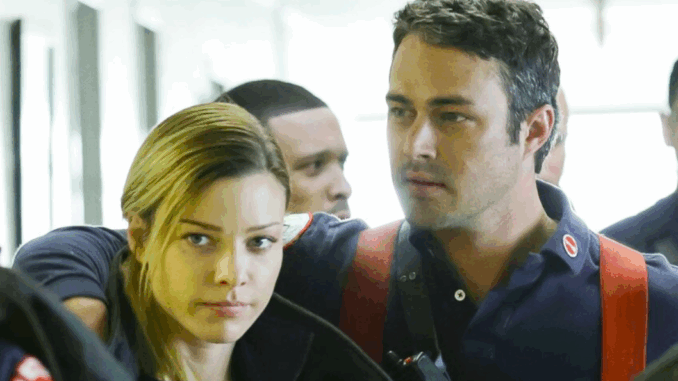
In a television landscape saturated with high-stakes dramas and adrenaline-fueled procedurals, Chicago Fire stands out for something far more intimate: the powerful, unwavering bond between the men and women of Firehouse 51. Since its debut in 2012, the series has captivated audiences not just with burning buildings and daring rescues — but with a deeper emotional heartbeat rooted in loyalty, camaraderie, and the simple, unshakable truth: no one fights alone.
A Brotherhood Forged in Fire
Firefighting is one of the most dangerous professions in the world. And in Chicago Fire, every emergency is a reminder that these characters rely on more than just training and tools — they rely on each other. The show’s emotional weight comes from this truth: a firefighter’s life depends on their team.
Whether it’s Kelly Severide charging into a burning structure with little regard for his own safety, or Joe Cruz stepping up for a friend in crisis, every episode reinforces the idea that brotherhood is not a slogan — it’s a way of life. These aren’t just coworkers. They’re family.
The intensity of what they experience together — life-or-death moments, personal sacrifices, shared grief — cements a bond that cannot be broken. It’s not just about who runs into the fire. It’s about who stands with you afterward, when the adrenaline fades and the trauma lingers.
Emotional Realism Behind the Uniform
While many firefighter dramas focus heavily on the action, Chicago Fire dares to pause. It shows us the emotional aftermath — the raw, messy, human responses to tragedy and triumph. Viewers witness deep conversations in the bunk room, late-night confessions over beers at Molly’s, and silent support when words aren’t enough.
One of the show’s most iconic moments of brotherhood came after Otis’s tragic death. The grief was palpable, not only because fans lost a beloved character, but because of how deeply his loss affected the entire house. From Cruz’s heartbreak to Boden’s solemn leadership, every reaction was rooted in real, authentic love.
Brotherhood in Chicago Fire is not toxic masculinity disguised as strength. It’s vulnerability. It’s showing up for one another even when you have nothing left to give. It’s checking in, holding space, forgiving, and carrying each other through the dark.
Boden: The Patriarch Who Leads With Heart
Chief Wallace Boden is more than just a commanding officer — he is the emotional anchor of Firehouse 51. His presence is steady, his leadership firm but compassionate. He represents the best of what brotherhood can be when led with honor.
He’s the first to defend his team, the first to remind them of their worth, and the last to abandon anyone. His speeches, often delivered in times of crisis, aren’t just motivational — they’re deeply personal. Boden doesn’t just lead a firehouse. He shepherds a family.
Realistic Relationships, On and Off the Job
The friendships at the heart of Chicago Fire feel lived-in. Severide and Casey. Kidd and Brett. Cruz and Otis. Mouch and Herrmann. These aren’t surface-level interactions created for easy laughs or tension. They are complex relationships that evolve over time — with disagreements, reconciliations, shared history, and profound moments of clarity.
What makes these bonds feel so authentic is the writing’s refusal to rush emotional development. Instead, Chicago Fire allows friendships to deepen slowly. It trusts the audience to recognize quiet loyalty just as much as grand gestures.
In Season 10, after Casey left for Oregon, Severide’s rare moments of silence about the departure spoke volumes. No long monologue was needed — just the weight of absence and the understanding that true friendship leaves a lasting imprint.
A Show That Honors the Everyday Hero
At its core, Chicago Fire is a love letter to first responders — not only for their heroism but for the invisible emotional labor they carry. It understands that being brave doesn’t mean being unbreakable. And it tells its audience: You’re never alone. Someone will always be there to pull you out of the smoke, both literally and metaphorically.
This ethos extends to the fan community, too. “No one fights alone” has become more than a motto for the characters — it’s become a rallying cry for viewers who’ve found comfort in the show’s themes of unity and resilience.
From honoring fallen heroes to showcasing the small, everyday moments of kindness between crewmembers, Chicago Fire doesn’t just dramatize firefighting. It dignifies it. It celebrates the very best of what it means to serve — not with ego, but with empathy.
Why Brotherhood Matters More Than Ever
In a world that often feels fragmented, Chicago Fire offers a vision of connection that feels both aspirational and accessible. Its portrayal of brotherhood reminds us that courage is communal. That healing happens when others sit with you in your pain. That real strength is knowing you’re never alone in the fight.
At Firehouse 51, every alarm bell signals a shared mission. Every victory is a collective one. Every loss, a burden shared. And that’s why the show continues to resonate after so many seasons.
Because at the end of the day, Chicago Fire isn’t just about running into fires. It’s about the people who run in — together.A
